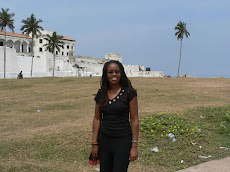Though extremely well-written and engaging, the article that is the subject of this post (
http://matadorabroad.com/my-day-of-african-justice/) had a few elements that moved me to comment, and probably rattle the innocent intentions of the author. But, as I said in the final comment (that the article’s author or some other moderator decided to remove), I engage in such “debate” regarding what I deem as cultural misrepresentation all the time. I do it with friends, family, and colleagues, in whatever forum, from whatever country, whenever I feel so moved. It’s not personal, nor about the length of the author’s story. In the case of this article, I read the piece, had a reaction, hit the reply button, and posted my opinion.
The article, “My Day of African Justice,” is about two volunteers supposedly from the Namibian town of Khorixas (where I served last year) who had their items stolen continuously over the course of a year, eventually discovered who took them, personally retrieved the items from the home of the thief, were forced to leave the recovered items with the police as “evidence,” and were then forced to appear in court, where and when the thief was found not guilty and they were told that their items were missing and would not be returned.
You can read the article yourself. It’s a fun read and paints vivid pictures. I’ll bias it a little, though. Within the article, I most directly took issue with the phrases, “African style of justice” and “Namibian sense of fairness.” I also felt that something was missing from the story. Exactly who allowed this to happen?
I regularly interact with citizens of various African countries who have very distinctive politics and legal systems, so I don’t really know if I buy the existence of an “African style of justice.” What goes on in Namibia, in Zimbabwe, and in Nigeria, where most of my local friends call home, can hardly be considered the same. Secondly, I regularly interact with Namibians of various ethnic and tribal backgrounds. The commentaries made about the others’ value systems are sometimes a bit biting. Just today, I endured comments by a “Coloured” suggesting that barbaric natures of discipline are culturally appropriate by “Oshivambos” and “Namas.” Just from today's comments alone, I’m pretty sure that Namibians across the ethnic and class spectrum have different notions of fairness.
Within the back-and-forth banter I had with the author, I was taken aback when she asked me, “Is there really a need to defend Khorixas, Namibia, or even all of Africa?” against her story. Here lies a bigger issue that I’ve thought about often.
From the first days of my orientation as a volunteer here, I have found myself defending Namibia, it’s teachers and educational system, and it’s road to progress, from what I deem to be gross mis-generalizations. My underlying mission is to have people think about allegations they make and reflect on the cultural context, to be sure that they are truly accurate. Once evidence is available, I am accepting. It’s just curious that I am so defensive. I think it is because I consider myself a member of many communities that have been culturally misrepresented in the past. That, and because of my studies and leanings toward holistic analysis, anthropology, and empathy.
In any event, I asked the author about more details (location and timeline) in her case, because it reeked of corruption, but she didn’t share them. My closest friend in Namibia is a magistrate and it would be interesting to see if she knew what actually happened and why. I guess I am not as accepting of such blatant injustice as the author (although I do not know the whole story and all the actions they took). I think I want to know a somewhat different Namibia, one that has civilians stealing (as they did my housemate's clothes from our outside line), but one that does not have members of the legal and judicial system obnoxiously laughing in the face of victims.
Her reported case leads me to wonder how useful it would be to have regular “crime against volunteers” reports sent by volunteer program heads to a partner police division in their respective countries. This way when things that are so blatantly wrong happen, there is at least one place for an attempt at recourse.
Theft is not culturally relative. You simply do not break into someone’s home, take what is not yours, identify yourself, and then get away without much constructive ado. This is especially important when volunteers, individuals requested by the host country’s government to meet specific areas of need, are the victims. Perhaps I am a bit too naïve and I have too much faith in partnerships and contracts, but until it is proven otherwise, my optimism will stand.
You can read the article (
http://matadorabroad.com/my-day-of-african-justice/). Enjoy. The website is also very informative.

 Nahas Angula is one of the first names I learned when researching the foreign land of Namibia where I’d be living, partnering, and working for at least one year. Angula’s name popped up in my Google searches, and stood out because he is a fellow alumnus of Teachers College, Columbia University, having earned his M.A. and M.Ed there in 1979. He is the current Prime Minister and was the first Minister of Education of the newly independent Republic of Namibia.
Nahas Angula is one of the first names I learned when researching the foreign land of Namibia where I’d be living, partnering, and working for at least one year. Angula’s name popped up in my Google searches, and stood out because he is a fellow alumnus of Teachers College, Columbia University, having earned his M.A. and M.Ed there in 1979. He is the current Prime Minister and was the first Minister of Education of the newly independent Republic of Namibia. 










.jpg)